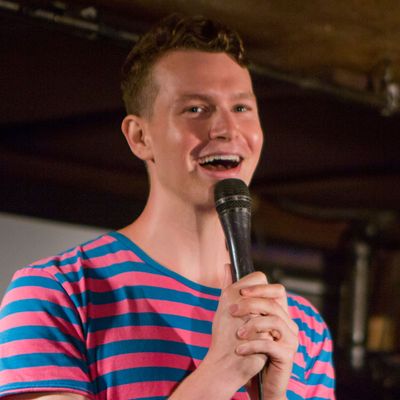
Zach Zimmerman (@zzdoublezz) is a queer comedian, writer, and producer whose work has appeared in The New Yorker, McSweeney’s Internet Tendency, New York Magazine, and the New York Times. See him live at his album recording encore at Union Hall, Queer EyeRL at the Bell House, or stay in bed and follow him on Insta.
This week, Zimmerman talked with me about getting started in comedy, using Twitter as a private joke notebook, and being erratic and undefined online.
How did you first get started in comedy?
There was this saint of a woman, Rose Ann Burgess, who ran a free after-school program called Kids Creating Original Opera in my hometown Roanoke, Virginia. She came to my fifth-grade public elementary school, asked if any kids wanted to write an opera, and changed my life. That summer, we wrote an opera (it was a musical) about a kid who said he was really good at basketball, but he was not. It was called Dribbles ‘N’ Hits and the final number was “Don’t Be Something You’re Not (Cause You Know You’re Gonna Get Caught).” I did plays and theater through high school, and I was the first in my family to go to college, so naturally I was first in my family to join a college improv team.
What role, if any, does Twitter play in your overall comedy career?
I have an itsy, bitsy, teenie, weenie Twitter following, so I use it as a little private joke notebook that a handful of people algorithmically eavesdrop on. You know that Bible story where the poor lady tithes less than the rich guys, but Jesus says she actually gave more? That’s what I feel like when my followers give me five likes. I’m like, “Thank you. You gave more.” (Also, I truly cannot believe I’m citing a Bible story.) So I do look back at tweets that gained a little bit of traction and see that as a signal to explore the topic further onstage, in humor pieces, and in therapy.
Who are some of your comedy influences?
My dad and my ex-boyfriend both have these incredible senses of humor, which they used to deflect important conversations I wanted to have with them.
I feel influenced by great monologists (Spalding Gray, Mike Daisey, Mike Birbiglia, David Sedaris) and my queer comedian peers in New York, Chicago, and L.A. Most recently, Hannah Gadsby, whom I saw live at the Soho Playhouse and will continue to brag about until the day I die, had an impact on me. Her queer coming-out story, reflections on trauma, processing it, mining it for laughs, and her thoughts on mental health really resonated with me and affected my first comedy album I just recorded. Over the year I was developing the material, I realized I was treating traumatic events flippantly to find the best jokes. The audience wanted to feel with me what I had gone through before getting to a punch line. So I learned that the most truthful and honest thing (which is my ultimate comedic pursuit) was to re-create the moment, honor the pain, and then let the story unfold in a surprising way with a funny comment.
Is your voice online similar to your voices onstage and in real life?
Oh great Q. I’d say the subjects I’m interested in (sex, religion, family, queer culture, death, meaning, technology) are pretty consistent online, onstage, and IRL, but my voice online is the most erratic. Since I don’t have to sustain that voice for a long set onstage or on a first date, I can be playful and no one is going to comment “THIS IS OFF BRAND! WHY ISN’T THIS MORE SARCASTIC AND/OR VULNERABLE.”
In conclusion: Onstage, I’m open and vulnerable and interactive. On Twitter, I’m erratic. In real life, I’m single. 😈
Do you prefer topical or evergreen tweets?
Whichever’s on sale.
Karen Chee is a Brooklyn-based comedian who writes for The New Yorker, McSweeney’s, and Shondaland, among other cool websites.

